|
|
|
Sort Order |
|
|
|
Items / Page
|
|
|
|
|
|
|
| Srl | Item |
| 1 |
ID:
064497
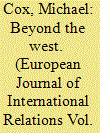

|
|
|
| 2 |
ID:
122949
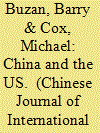

|
|
|
|
|
| Publication |
2013.
|
| Summary/Abstract |
Competing great powers, and the potential for clashes among them when there are changes of place at the top of the hierarchy, are an old story in international relations. Against this realist model of inevitably warlike power struggles stands another idea: 'peaceful rise'. China committed itself to this policy a decade ago, and arguably adopted it as far back as the shift to reform and opening up in the late 1970s. The only other modern great power than can possibly claim to have risen peacefully is the United States. Since there are only two cases of attempted peaceful rise, it is worth asking what parallels can be drawn between the United States and Chinese experiences. Given their different placements in history, with the rise of the United States having taken place between 1865 and 1945, a century earlier than China's current rise, what lessons, if any, can be learned for China from the United States experience? This article looks closely at both the meaning of 'peaceful rise' and the credibility of the United States and Chinese claims to it. It surveys the key points of similarity and difference between the United States and China during their process of rise, comparing contemporary China with the United States of the late 19th and early 20th centuries, not with today's United States. The conclusion sets out six lessons for China and for international society that can be drawn from comparing the two cases.
|
|
|
|
|
|
|
|
|
|
|
|
|
|
|
|
| 3 |
ID:
061161
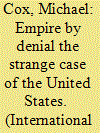

|
|
|
| 4 |
ID:
057765
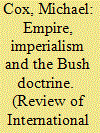

|
|
|
| 5 |
ID:
081319
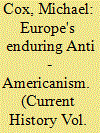

|
|
|
|
|
| Publication |
2008.
|
| Summary/Abstract |
Anti-Americanism has embedded itself in a very profound way in Europe's foreign policy discourse. . . . This fact, more than any changes about to take place in the White House, will shape the transatlantic relationship for years to come
|
|
|
|
|
|
|
|
|
|
|
|
|
|
|
|
| 6 |
ID:
119928
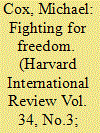

|
|
|
| 7 |
ID:
107560
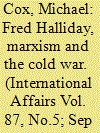

|
|
|
|
|
| Publication |
2011.
|
| Summary/Abstract |
Though possibly best known today as a specialist on the Middle East and Islam, it is often forgotten how central the Cold War was in defining Fred Halliday's understanding of world politics before 1989 and indeed even after. Building on the earlier work of Isaac Deutscher and E. H. Carr, Halliday developed a distinct theory of the Cold War which afforded him great insights but ultimately failed in explaining the complexities of the East-West relationship, and why it came to an abrupt conclusion in the late 1980s.
|
|
|
|
|
|
|
|
|
|
|
|
|
|
|
|
| 8 |
ID:
058520


|
|
|
| 9 |
ID:
078552
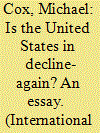

|
|
|
|
|
| Publication |
2007.
|
| Summary/Abstract |
After a decade long period during which it was optimistically assumed that under conditions of unipolarity the United States was likely to reign supreme in world affairs for many decades to come, the mood, and with it the debate about the future of the US, has changed dramatically. Hubris has been overtaken by a new mood of intellectual pessimism; the idea of a new American century by the notion of a failing Empire. Though few may wish to call it such, there is no doubting the fact that a new'decline debate'is now under way in the United States, one that will no doubt be as intense, if not more so, than the one occasioned by the publication in 1987 of Paul Kennedy's hugely influential The rise and fall of the Great Powers. In this article, the sources of the decline debate in the US are traced, as are how and why the debate disappeared following the collapse of the USSR, and why it has now returned to haunt the American landscape
|
|
|
|
|
|
|
|
|
|
|
|
|
|
|
|
| 10 |
ID:
136237
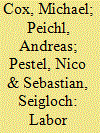

|
|
|
|
|
| Summary/Abstract |
Germany continues to play a pioneering role in replacing conventional power plants with renewable energy sources. While this might be beneficial with respect to environmental quality, it also implies increasing electricity prices. The extent to which this is associated with negative impacts on employment depends on the interrelationship between labor and electricity as input factors in the production process. In this paper, we estimate cross-price elasticities between electricity and heterogeneous labor for the German manufacturing sector. We use administrative linked employer–employee micro-data combined with information on sector-level electricity prices and usage over the period 2003–2007. We find positive, but small conditional cross-price elasticities of labor demand with respect to electricity prices, which means that electricity as an input factor can be replaced by labor to a limited extent when the production level is held constant. In the case of adjustable output, we find negative unconditional cross-price elasticities, implying that higher electricity prices lead to output reductions and to lower labor demand, with low- and high-skilled workers being affected more than medium-skilled. Resulting adverse distributional effects and potential overall job losses may pose challenges for policy-makers in securing public support for the German energy turnaround.
|
|
|
|
|
|
|
|
|
|
|
|
|
|
|
|
| 11 |
ID:
167196


|
|
|
|
|
| Summary/Abstract |
One hundred years ago, the first Department of International Politics was established at the University College of Wales, Aberystwyth, with the express purpose of seeking in Arnold Toynbee’s prophetic words (uttered many years later) – of breaking decisively with the ‘habit of nationalism’. As David Davies in the founding statement put it, by moving beyond ‘insular and vested prejudices … the shattered family of nations’ could be brought back together again and a new world order established. Yet as the history of the twentieth century showed – and the new century looks to be no nearer to realizing that original dream – nationalism has throughout continued to retain its power of mobilizing peoples and setting nation against nation. How and why this happened and with what consequences is the subject of this article.
|
|
|
|
|
|
|
|
|
|
|
|
|
|
|
|
| 12 |
ID:
119269
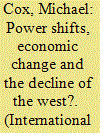

|
|
|
|
|
| Publication |
2012.
|
| Summary/Abstract |
It has become the new truth of the early twenty-first century that the Western world we have known is fast losing its pre-eminence to be replaced by a new international system shaped either by the so-called BRICs comprising Brazil, Russia, India and China, the 'rest', or more popularly by that very broadly defined geographical entity known as Asia. This at least is how many economists, historians and students of world politics are now viewing the future of the larger international system. This essay does not dispute some self-evident economic facts. Nor does it assume that the world will look the same in 50 years time as it does now. It does, however, question the idea that there is an irresistible 'power shift' in the making and that the West and the United States are in steep decline. Specifically, it makes a number of critical arguments concerning the new narrative. First, it suggests that this story, by reasonably focusing on what is obviously changing in the world, unfortunately ignores what is not; as a result, it underestimates what might loosely be termed the continued structural advantages still enjoyed by the United States and its major Western allies. Second, while it is true that many new states are assuming a bigger role in the world economy, their rise needs to be looked at more carefully than it has been so far; indeed, when such an examination is undertaken, it becomes increasingly clear that the rise of others - including China - is still hemmed in by several obstacles, internal as well as external. Third, though the Asian region, and China as part of it, is assuming an ever more important role in the wider world economy, this development should not be seen as marking the beginning of a new Asian Century. This now popular idea is not only conceptually problematic, it inevitably leads to an underestimation of other key areas in the world including incidentally the Transatlantic region. Finally I suggest that if the dubious idea of a power shift is taken to be true, this could very easily lead to greater international insecurity and conflict. Understanding the modern world better than many seem to be doing right now is therefore not only intellectually important; it is strategically necessary too.
|
|
|
|
|
|
|
|
|
|
|
|
|
|
|
|
| 13 |
ID:
098293
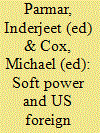

|
|
|
|
|
| Publication |
London, Routledge, 2010.
|
| Description |
x, 236p.
|
| Series |
Routledge studies in US foreign policy
|
| Standard Number |
9780415492034, hbk
|
|
|
|
|
|
|
|
|
|
|
|
Copies: C:1/I:0,R:0,Q:0
Circulation
| Accession# | Call# | Current Location | Status | Policy | Location |
| 055178 | 327.73/PAR 055178 | Main | On Shelf | General | |
|
|
|
|
| 14 |
ID:
079778
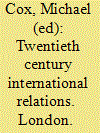

|
|
|
|
|
| Publication |
London, Sage Publications, 2007.
|
| Description |
v1(xxxv, 412p.); v2(vi, 484p.); v3(vi, 403p.); v4(vi, 373p.); v5(xxxii 428p.); v6(vi, 375p.); v7(vi, 398p.); v8(vi, 396p.)
|
| Series |
Sage library of international relations
|
| Contents |
Vol 1: The international systems, 1815-1945
Vol 2: The transition to the post-cold war security agenda
Vol 3: The United States: from superpower to empire
Vol 4: Globalization
Vol 5: Europe in the international system
Vol 6: What happened to the pacific century?
Vol 7: The rise and fall of the third world
Vol 8: Beyond the twentieth century
|
| Standard Number |
9780761944652
|
|
|
|
|
|
|
|
|
|
|
|
Copies: C:8/I:0,R:0,Q:0
Circulation
| Accession# | Call# | Current Location | Status | Policy | Location |
| 052966 | 327.0904/COX 052966 | Main | On Shelf | General | |
| 052967 | 327.0904/COX 052967 | Main | On Shelf | General | |
| 052968 | 327.0904/COX 052968 | Main | On Shelf | General | |
| 052969 | 327.0904/COX 052969 | Main | On Shelf | General | |
| 052970 | 327.0904/COX 052970 | Main | On Shelf | General | |
| 052971 | 327.0904/COX 052971 | Main | On Shelf | General | |
| 052972 | 327.0904/COX 052972 | Main | On Shelf | General | |
| 052973 | 327.0904/COX 052973 | Main | On Shelf | General | |
|
|
|
|
| 15 |
ID:
106348
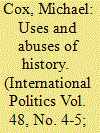

|
|
|
|
|
| Publication |
2011.
|
| Summary/Abstract |
In the by now extended debate about the end of the Cold War and its causes, very little attention has been paid to the role played by historical memory in helping shape the way policy-makers approached the collapse of the post-war order. As this article shows, many, if not most policy elites at the time, confronted the passing of the old world with a great degree of caution and trepidation; and one of the key reasons they did so, it is argued here, is because of their reading of the past. This reading, I go on to suggest, made many of them especially cautious and fearful when faced with great change. In the end of course these changes proved irresistible, and for liberals at least seemed to augur in more peaceful and prosperous times. However, as we shall see here, this unguarded optimism was not much in evidence as the old international system and the other superpower collapsed after 1989. Looking backwards rather than forwards, policy-makers approached the new dawn with much less enthusiasm and optimism than their public pronouncements seemed to indicate at the time or later.
|
|
|
|
|
|
|
|
|
|
|
|
|
|
|
|
|
|
|
|
|